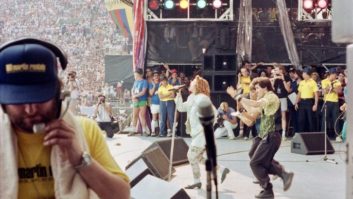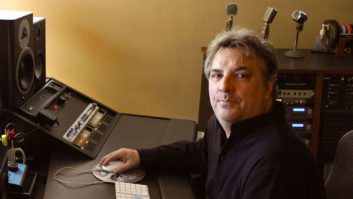Philadelphia, PA—Recent revelations about the multitude of recordings lost in the 2008 Universal Music Group vault fire in Los Angeles highlighted issues related to the storing and protection of archival assets from a perspective greater than simply commerce, touching on complex issues such as cultural heritage. Meanwhile, another tape archive story played out on the other side of the country at Philadelphia’s Drexel University; while this account raised similar issues regarding archiving, preservation and prioritization of resources, the events resulted in a very different outcome.
Back in 2005, Drexel’s Music Industry program received a donation of some 7,000 unclaimed tapes produced at Philly’s famed but now defunct Sigma Sound Studios. The studio’s founder, Joe Tarsia, had tried his best to reunite the tapes—which included many outtakes but also entire small-label catalogs—with their rights holders. Happily, the new property owners understood that, while they had possession of the physical assets, they had no claim to the underlying intellectual property rights, and donated the tapes to Drexel.
“Long story short, what happened was the right thing. This material was placed in the hands of an institution,” says Toby Seay, professor of recording arts and music production at Drexel and a recording engineer who has worked with Dolly Parton, Randy Travis, Delbert McClinton, Kirk Whalum and others.
Seay, department head at the university’s Westphal College of Media Arts & Design, comments, “It’s a model that record companies should look at. Every university has an archive library system and an IT department, and a lot of them have music technology programs where all the expertise that would be needed for a tape archive exists.”
Drexel has a new storage facility for the tapes, but human resources are limited—Seay is overseeing the project with student volunteers—and it took years just to catalog everything, even though the tapes are well documented. “I know what’s there and can find stuff; now we’re starting to enhance that metadata so we can dig a little deeper,” says Seay, who thus far has heard less than 10 percent of the archive.
Initially, the university didn’t have the machines necessary to play back many of the tapes. Seay’s first purchase was a Studer A827 with 2-inch 16- and 24-track, and 1-inch 8-track headstacks and guides. “Mike Spitz at ATR Services procured that for me and put together an ATR-102 with 1/2- and 1/4-inch headstacks. Those gave us five formats.” Drexel also has DAT machines, a Mitsubishi 32-track digital unit and a Sony 3348 16-bit digital 48-track unit that Seay found locally for $500. “That covers almost everything in the collection,” he says.
Tarsia and the Sigma staff favored Scotch 250 tape stock, but some recordings were made to Ampex 456 and, in the digital era, 467, and some of it has mold, says Seay. “It’s all on a spectrum moving towards bad. Even the good quality Scotch tape generally has to spend some time in the oven for thermal treatment.”
As luck would have it, when Faith Newman, senior vice president of A&R and catalog development at Reservoir Media Management, called Seay looking for tapes by artists on the Philly Groove Records label, which her company had acquired, he had already discovered a gem. “I had truly stumbled on it, because in the early days I did not have the capability of playing but a couple of formats.”
Listen to Nat Turner Rebellion’s “Tribute to a Slave” on Spotify
Sigma, which opened in 1968, became a Dolby A house early on, so Seay initially sought out 1/4-inch non-Dolby masters from the studio’s earliest days to test his playback system. “There, in November 1969, was this tape by Nat Turner Rebellion,” Seay recalls. “A band named after a famous slave revolt and a song called ‘Tribute to a Slave.’ How could I not play it?”
The band, named for a slave uprising in Virginia in 1831, played exactly the type of Philadelphia R&B you might imagine emerging from the studio that recorded the likes of The Trammps, The O’Jays and the Three Degrees, and the label that launched The Delfonics. “Tribute to a Slave” was only the tip of the iceberg, though—Seay had found an entire album of unreleased material by the band, who were signed to Philly Groove.
The discovery started a conversation, says Seay, and an ongoing relationship with Reservoir. As Drexel began to restore and digitize the Philly Groove catalog, which was recorded at Sigma between 1968 and 1972, the partnership developed. Beginning in 2013, Reservoir released a series of compilations by The Delfonics, First Choice and other Philly Groove artists. In 2015, Reservoir allowed select students in Drexel’s music industry technology program to mix and master various original 16-track recordings and present them at a special listening event, “Uncovering the Philly Groove,” attended by Newman, Tarsia and other Philly music luminaries.
Then there was a lightbulb moment. Why not combine rights-holder Reservoir’s publishing expertise with Drexel’s independent, student-run MAD Dragon Records label and finally release Nat Turner Rebellion’s debut album, 50 years after it was recorded? “We teamed up with Vinyl Me, Please, a vinyl-only record club. They did the physical pressing,” says Seay of “Laugh to Keep from Crying,” which was released at the end of March. “Our label did all the PR and marketing and the digital releases, so it’s now on all the streaming services. We took advantage of everyone’s strengths instead of any one of us trying to do all of it, and it’s a much better product because of that.”
A record label may not even consider preserving and digitizing a tape unless it sees some commercial advantage, thus exposing the asset to the potential of a catastrophic loss. The solution, then, may be for labels to partner with an institution that can find some research or educational value in the assets. As Seay reports, iconic New Zealand label Flying Nun Records has donated its archive to the Turnbull Library, a division of the country’s National Library. The library has pledged to digitize the entire collection over the next three years and make it available for research. Seay was recently at the University of Calgary, he adds, researching the EMI Canada collection that is archived there, with some preservation funding attached.
“We’re under a ticking clock to get stuff done,” Seay says, noting that he is facing tape degradation and machine obsolescence, and tough choices regarding which assets take priority. “What resources are available when you deal with cultural heritage materials? In some cases, if it’s in a vault with a company like UMG, it’s a monetary asset to them, but to the world, it’s cultural heritage material. In either case, there are different priorities for what gets preserved because we can’t preserve it all. We don’t have the time and we certainly don’t have the resources.”
Drexel University • www.drexel.edu
MAD Dragon Music Group • www.maddragonmusic.com
Reservoir Media Management • reservoir-media.com







